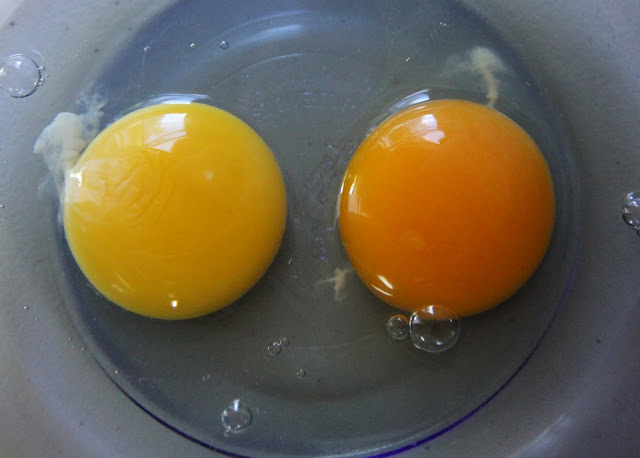this post was submitted on 28 Aug 2024
1055 points (97.3% liked)
People Twitter
5974 readers
1345 users here now
People tweeting stuff. We allow tweets from anyone.
RULES:
- Mark NSFW content.
- No doxxing people.
- Must be a pic of the tweet or similar. No direct links to the tweet.
- No bullying or international politcs
- Be excellent to each other.
- Provide an archived link to the tweet (or similar) being shown if it's a major figure or a politician.
founded 2 years ago
MODERATORS
you are viewing a single comment's thread
view the rest of the comments
view the rest of the comments

100%. If you break a store egg and a farm egg next to each other, especially in the spring when the chickens start having access to insects again, the farm egg is almost cartoonishly orange next to the store egg.
I had a farmer I got eggs from for years and years. I was so lucky. 50 cents a dozen from 2003-2017. I eat a lot of eggs too. My family goes through two 30 packs a week.
He told me about a month before he stopped. “I done got old, can’t do it anymore. I keep falling and if I break my hip they might as well take me out back and give me a mercy bullet.”
I asked everyone under the sun. No one I found after that was consistent. I thought I found someone a few times, they disappeared after a few months. I gave up and started buying my eggs from the store.
All things must pass. Damn though, that one hurt to lose.
During my quest to find a new source for eggs though, I found someone with duck eggs. I figured, “Ahh, an egg is an egg, right?” Wrong. Duck eggs are not very tasty. They’re fine as an additive to a cake or something, but no way will I ever eat them again. Gah.
Man oh man, have I? Yessir.
I was about to close on a loan for a small farm. I had space for horses, chickens, cows, whatever I wanted. I was so excited, it was all I could think about. I had the deal of a lifetime on the table. The man who took care of me as a kid and raised me to understand technology, who bought me entire mountains of classic computers from school auctions and was there to guide me into DOS and then Linux, he was the neighbor. He was going to co-sign on the loan for me. All I had to do was move the fence a little bit for him and give him a piece of contested land that I had no interest in.
I took the kids, had them pick out their rooms. We were all very excited. We were dreaming of our lives there. The neighbors on either side were lifelong friends. It was a dream, seriously.
Right before closing on the loan I caught their mom with another man. My whole world turned upside down and I was scared to make a move.
The next three years were complete and total hell, my kids were traumatized. Everything just went downhill.
4 years after our split, she was dead from breast cancer, lung cancer, brain cancer, bone cancer.
Life is beautiful, but it can be ugly.
Part of me wonders if she lost it because she had cancer and we didn’t know it. Everything she did was so far from anything I ever dreamed could happen that I can’t help but wonder.
Still though. I’m in the best relationship I’ve ever been in, I have more children now and life goes on, just like it has for anyone who has ever had a hard time.
I’ll get there again eventually. I’m sure I will. If I don’t, I’ll be happy with what I have. No room for chickens. That’s fine with me.
Sorry for the book.
That was a fucking wild read.
Thanks for sharing, and sorry for all the pain. I hope you get to have all good things in your life.
Not quite the same, as we were only together a short time and kids were not involved, but I had a gf who went super loony with “shadow people” and ideas that aliens were after us. She had a serious stroke about a year after we split up and I wonder whether her mental break while we were together was somehow related.
Bro you don't need a farm to raise chickens. You can do it in a yard if you want. You can also see about buying stock in a farm or in a food share.
I'm sorry man. Life can really be an arse sometimes. I hope you'll manage to finally live that dream. Your attitude is in the right place for sure.
Not OP, but I'd absolutely love to, but I don't want to be the only one caring for them. I can have up to 6 according to city ordinances, which is plenty to keep us fed with as many eggs as we care to eat. However, they do require a non-trivial amount of work and they're a little stinky, so I'm hesitant to do it, especially since I have three young children and a long-ish commute. But my kids probably old enough to help out (they help w/ our cats), so we'll see.
I bought some eggs from some neighbors and they were absolutely delicious. I also miss duck eggs, and looking up caring for them, it honestly doesn't seem worth the hassle. But if someone offered, I'd totally buy a bunch of duck eggs and eat them all the time.
What’s really weird is that eggs are remarkably similar even when raised on entirely different diets or conditions. While farm raised eggs and organic or free range eggs are slightly better, the difference is much more minimal than I think most people think.
I went on a whole deep dive with that topic a while back and the result of that research was pretty much just that eggs themselves are pretty good for you but it matters a lot less which eggs you buy and more than you eat more of them.
All research points to your conclusion, and the downvoters and further comments don't know shit. The feed affects the color almost entirely with extremely minor differences in everything else.
https://youtu.be/0YY7K7Xa5rE
In depth comparison. I still buy pasture raised meat & eggs for my family for ethical reasons. You're right though, it's mostly appearance as for the actual product.
Bullshit.
Color, consistency, flavor, fragility in the shell, fragility of the yolk, length of time to begin getting weird, length of time to spoil.
Pasture raised hens lay better eggs, hands down.
We'll bake with sad eggs, but fried or poached? Has to be the good eggs.
I highly recommend learning about chicken husbandry before you make this claim. There are decades of research across numerous countries talking about chicken feed and egg quality. Some farmers know by egg flavor alone if their chickens need supplements and which ones. Chickens can get really weird diseases if they aren't taken care of properly and this absolutely affects their eggs. I think what you're noticing is that the eggs you buy as a consumer are about the same for you personally, but that doesn't mean you can then turn around and claim that "eggs are remarkably similar even when raised on entirely different diets or conditions" and be actually correct.
I don’t understand the point of your comment because I’m not making a claim about animal husbandry necessarily. I think there are plenty of reasons why someone would want non-factory farmed eggs. All I was highlighting was that the difference in actual nutrition is fairly minimal in the studies I looked at and that was surprising to me. Like for how much people talk up farm raised eggs and how different the taste is and everything, I’ve always assumed that raising your own chickens results in drastically different nutritional qualities and I couldn’t find anything backing that up.
It's still an egg.
And are the nutritional studies you've read paying attention to vitamins and micronutrients? Or just calories and fats and protein contents?
I think at the time I was particularly focused on proteins and cholesterol for dieting reasons so I was less concerned with micronutrient content. That being said, the lack of differences between those things in eggs led me to dig a little deeper.
Specifically I wanted to know about eggs eaten in Japan since they take eggs pretty seriously over there and I had watched a mini documentary on it. And if I recall right, what I found was that yes there may be some minor differences in vitamin content or flavor, but they are just minor differences. I guess what surprised me was that I did expect large changes in the health of a caged egg and a carefully managed Japanese egg, but that didn’t turn up in my research. I’m not an expert though, but am scientifically literate.
So to bring it full circle, I know a dietician and I consulted them about it and they did confirm that yes, vitamin content may change though he said the levels of those vitamins and difference between the eggs would be a wash. He said there isn’t any nutritional reason that he knows of to recommend one egg over another.
This is backed up by what the conclusion I came to.The thing I feel most certain about is: In the grocery store, all eggs are the same. And that’s largely true. Now the difference between grocery store and local farm directly is more substantial, but only in cases with high quality food.
I do want to say I’m obviously not an expert, my dietician friend does not specialize in this so that’s the disclaimer, and both he and myself don’t have time to dive deep and if someone wants to present counter research on this, we’d love to be wrong about it.
Do you have sources for your claim that factory farmed eggs are nutritionally the same as cage free eggs?
https://www.ncbi.nlm.nih.gov/pmc/articles/PMC8103914/
https://www.cambridge.org/core/journals/renewable-agriculture-and-food-systems/article/abs/vitamins-a-e-and-fatty-acid-composition-of-the-eggs-of-caged-hens-and-pastured-hens/552BA04E5A9E3CD7E49E405B339ECA32
No, it’s been awhile since I read up on it. But looking at your sources I come to a similar conclusion. There are differences but they’re minor differences.
Agree to disagree they are minor, especially at scale (eating more of them as you suggest).
That may be true. I roped a dietician friend of mine in on this and he confirmed my suspicion. The nutrient differences you’re noting, he claimed, are not going to be significant enough sources to matter. But those minor differences exist if people care about them.
Wait, would that result in yellower chicken?
Joke aside, healthier chicken?
I don't know, to be honest. I think they taste better, but I know it could be purely psychological... They're my chickens, after all. I do think the shells are sturdier (not sure if it's thickness or composition) when they have more bugs to eat. I don't know about any claims regarding nutritional differences, but the eggs themselves do have some noticeable and measurable differences.
Huh, I'd swear most store eggs I get have yokes closer the the right one in colour